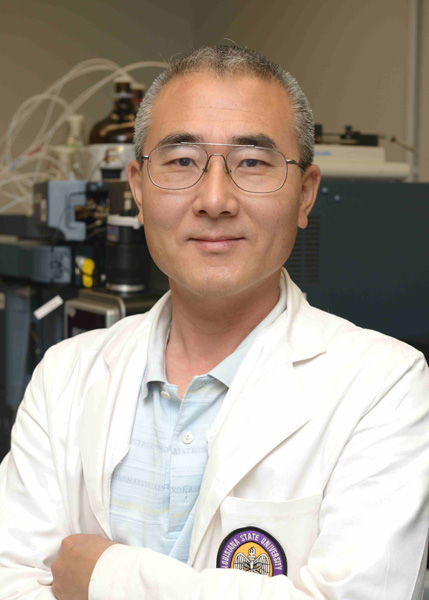Bok Kyoo Jun, PhD
Instructor-Research
Neuroscience, Cell Biology and Anatomy
Neuroscience Center of Excellence
School of Medicine, LSU Health
Floor 8, Room 815
2020 Gravier Street, Suite D
New Orleans, LA 70112
Phone: (504) 599-1521
Fax: (504) 599-0891
Research interests/plan
I am interested in precisely defining and characterizing the lipids that comprise the brain and retina. We know that at the onset of brain disease and retinal degeneration the component lipids begin undergoing changes, where some disappear, some are reduced, some increase, and some appear for the first time.
My research is centered around mass spectrometry. I extract the lipids of interest and analyze them by conventional mass spectrometry or by MALDI (imaging) mass spectrometry. I have access to two colonies of mice that have been genetically altered so that they now have characteristics of two blinding eye diseases, Age-related macular degeneration (AMD) and retinitis pigmentosa (RP).
My long-term research plan is to isolate retinas and the underlying retinal pigment epithelium from these mice, as well as those of normal mice, and create lipid profiles of these tissues at the onset of the disease, as well as at various times following disease progression. Regulation of these changes must involve enzymatic activity, so I would like to follow these changes in parallel studies where I define changes in proteins (enzymes). This will require me to initiate mass spectrometric techniques for proteomics, as well as my current work with lipidomics.
Once characterization has progressed, I wish to compare my results with changes in human degenerative diseases. I can have access to human donor eyes from NIH-sponsored eye banks in which some samples will be normal tissues, while others will be tissues expressing retinal degeneration.
I hope to define initial causes of these diseases, moving from a mouse study to human analysis, where my results can suggest possible means of intervention to prevent, slow, or halt these pathological conditions.
Education
2001 - Ph.D. in Physics,
Department of Physics and Astronomy
Tufts University, Medford, MA, USA
1991 - MS. in Astrophysics,
Department of Astronomy,
Seoul National University, Seoul, Korea
1988 - BS. in Astrophysics
,
Department of Astronomy,
Seoul National University, Seoul, Korea
Work Experience
2010 - 2016
LSU Health Sciences Center, Neuroscience Center of Excellence, New Orleans, LA
Post-Doctoral Researcher
2006 - 2010
LSU Health Sciences Center, Biochemistry, New Orleans, LA|
Post-Doctoral Researcher
2001 - 2005
Bruker Optics Inc., Billerica, MA
Applications Scientist
Publications
William C. Gordon, Virginia García López, Surjyadipta Bhattacharjee, David Rodríguez Gil, Javier Alcover Díaz, Fernando Pineda de la Losa, Ricardo Palacios Peláez, Concha Tiana Ferrer, Gabriela Silvina Bacchini, Bokkyoo Jun, Hélène Varoqui, Nicolas G. Bazan. A Nonsteroidal Novel Formulation Targeting Inflammatory and Pruritus-Related Mediators Modulates Experimental Allergic Contact Dermatitis. Dermatology and Therapy, 2018; 8 (1):111 DOI: 10.1007/s13555-018-0223-8
Jun, Bokkyoo, Mukherjee, Pranab K., Asatryan Aram, Kautzmann, Marie-Audrey, Heap, Jessica, Gordon, William C., Bhattacharjee, Surjyadipta, Yang, Rong, Petasis, Nicos A., Bazan, Nicolas G. Elovanoids are novel cell-specific lipid mediators necessary for neuroprotective signaling for photoreceptor cell integrity, Scientific Reports, 7:5279, 2017
Zhu J., Chaki M., Lu D., Ren C., Wang S.S., Rauhauser A.A., Li B., Zimmerman S., Jun B., Du Y., Vadnagara K., Wang H., Elhadi S., Quigg R.J., Topham M.K., Mohan C., Ozaltin F., Zhou X.J., Marciano D.K., Bazan N.G., Attanasio M. [2016], Loss of diacylglycerol kinase epsilon in mice causes endothelial distress and impairs glomerular Cox-2 and PGE2 productionAm J Physiol Renal Physiol. 2016 Feb 17:ajprenal.00431.2015. doi: 10.1152/ajprenal.00431.2015.
Rice D.S., Calandria J.M., Gordon W.C,. Jun B., Zhou Y., Gelfman C.M., Li S., Jin M., Knott E.J., Chang B., Abuin A., El-Samman T.I., Potter D., Platt K.A., Bazan N.G. [2015], Adiponectin receptor 1 conserves docosahexaenoic acid and promotes photoreceptor cell survival Nature Communications 6:6628 DOI;10.1038/ncomms7228
Calandria J.M., Asatryan A., Balaszczuk V., Knott E.J., Jun B.K., Mukherjee P.K., Belayev L., Bazan N.G. [2015], NPD1-mediated stereoselective regulation of BIRC3 expression through cREL is decisive for neural cell survival. Cell Death Differ. doi: 10.1038/cdd.2014.233
Sheets K.G., Jun B., Zhou Y., Zhu M., Petasis N.A., Gordon W.C. and Bazan N.G. [2013], Microglial ramification and redistribution concomitant with the attenuation of choroidal neovascularization by neuroprotectin D1, Molecular Vision, 19:1747-1759
Bazan N.G., Eady T., Khoutorova L., Atkins K., Hong S., Lu Y., Zhang C, Jun B., Obenaus A., Fredman G., Zhu M., Winkler J., Petasis A., Serhan C. and Belayev L. [2012], Novel aspirin-triggered neuroprotectin D1 attenuates cerebral ischemic injury after experimental stroke, Experimental Neurology, 236:122-130
Jun B. and Kim S. [2010], Real-Time structural transitions are coupled to chemical steps in ATP hydrolysis by Eg5 kinesin, Journal of Biological Chemistry, 285, 11073
Ding X., Fries D. and Jun B. [2006], A Study of Hydrogel Thermal-Dynamics Using Fourier Transform Infrared Polymer, 47:4718-4725
Kamberi M., Kim Y., Jun B. and Riley C.M. [2005], The Effects of Sucrose on Stability of Human Brain Natriuretic peptide [hBNP(1-32)] and Synthetic Human Parathyroid Hormone [hPTH(1-34)] Journal of Peptide Research, 66:348-356
Bothner B., Taylor D., Jun B., Lee K.K., Siuzdak G., Schultz C.P. and Johnson J.E. [2005], Maturation of a Tetravirus Capsid alters the Dynamic Properties and creates a Metastable Complex, Virology, 334:17-27.
Lee A.S., Galea C., DiGiammarino E.L., Jun B., Murti G., Ribeiro R.C., Zambetti G., Schultz C.P. and Kriwacki R.W. [2003], Reversible Amyloid Formation by the p53 Tetramerization Domain and a Cancer-associated Mutant, J. Mol. Biol., 327:699-709.

